Are Cat Hairs Bad for You?
Did you know that cats have nearly one hundred thousand hairs per square inch of their coat? And when those hairs fall out, they can end up in your food, clothes, or even in your lungs.
So, are cat hairs bad for you? It turns out that cat hair is not harmful to humans. However, cat hair can carry dander and saliva from cats which can cause allergic reactions in some individuals. Persons who are allergic to cat hair may experience symptoms such as sneezing, coughing, watery eyes, and difficulty breathing.
However, if you’re concerned about their hair, it’s best to avoid exposure. Let’s talk about whether cat hair poses any threat and many more. To clear out your curious mind regarding matters, check the article below.
Related Blog:
All the Reasons Why Cat Hair Is Bad for Humans?
Cats are often lauded for their cleanliness, but that doesn’t mean their hair is good for us humans. And why we consider that cat hair is harmful to humans. All the reasons are:
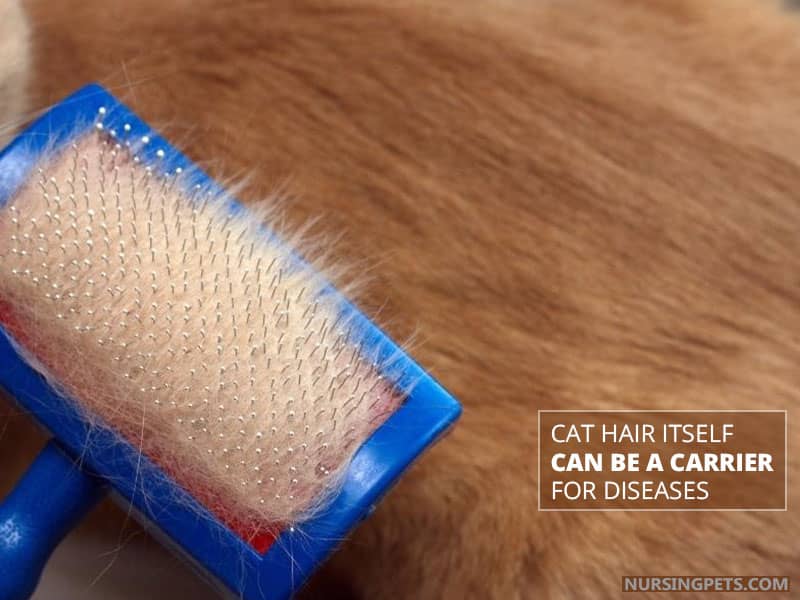
The main reason is that cat hair itself can be a carrier for diseases. Cats can carry a number of diseases that can be passed on to humans, including rabies, toxoplasmosis, and cat-scratch disease.
While these diseases are relatively rare, they can be very serious, so it’s best to avoid contact with cat hair if possible.
Another danger of cat hair is that it can trigger allergies in some people. Cat hair is covered in a protein called Fel d 1 and is found in cat saliva and skin, which can cause an allergic reaction in some people.
Another concern with exposure to cat hair is the risk of contracting parasitic infections. Cats can carry parasites such as fleas, ticks, and ear mites. These parasites can transmit diseases to humans.
Is Cat Hair Bad For Babies?
It is important to realize that cat hair is not hair. It is made up of keratin, which is the same protein that makes up human hair. So, cat hair is no different from human hair in terms of allergies.
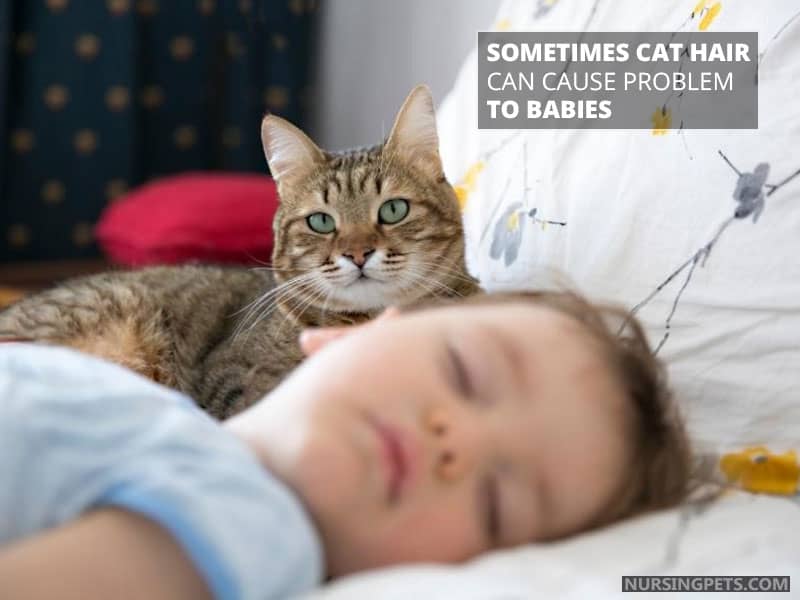
However, there are some other considerations to keep in mind. Cat hair can be a potential choking hazard for small babies. It can also be irritating to the skin, especially if your baby has eczema.
What Happens If Cat Hair Is Swallowed By Baby?
When your cat’s hair ends up in your baby’s mouth, it’s not likely to cause any problems. However, if your baby has a lot of hair in his or her stomach, it could cause an intestinal blockage.

Additionally, cat hair can be a choking hazard for small children. It’s important to seek medical attention immediately whenever your baby starts to cough or choke after swallowing cat hair.
The good news is that, in most cases, cat hair will pass through your baby’s system without any problems. However, it’s always best to err on the side of caution and keep an eye on your little one.
Is Cat Hair Bad For Females?
In case you’re a woman with a cat, you’ve probably been asked if cat hair is harmful to females. While it’s true that cats can transmit certain diseases to humans, there’s no evidence that their hair is dangerous to women.
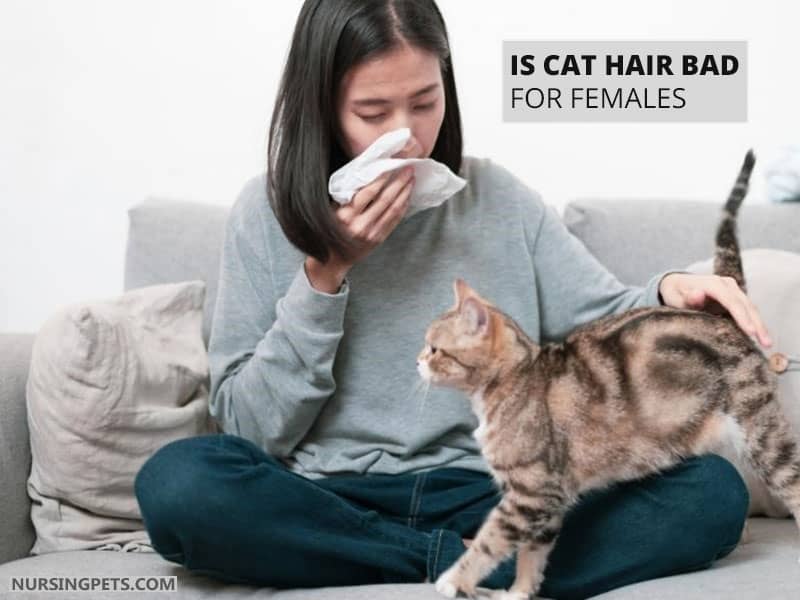
Cats are often blamed for causing allergies, but it’s the dander or dead skin cells that they shed that trigger an allergic reaction. So as a cat lover, you no need to worry about the effects of their hair on health.
Can Cat Hair Kill You?
The simple answer is no; cat hair cannot kill you. However, there are some potential risks associated with being exposed to too much of it.

Additionally, cat hair can also carry dust, pollen, and other allergens that can trigger asthma attacks or other respiratory problems in susceptible individuals.
So, while the cat hair itself is not deadly, it can cause different problems for you.
Can Cat Hair Cause Infection?
Yes, cat hair can cause infection if the cat is not clean. The bacteria and parasites that live on a cat can transfer to humans and cause infections.
Moreover, a study published in the Journal of Clinical Microbiology found that cat hair can harbor bacteria that can cause skin infections. Another study found that cat hair can also harbor the fungus that causes ringworm.
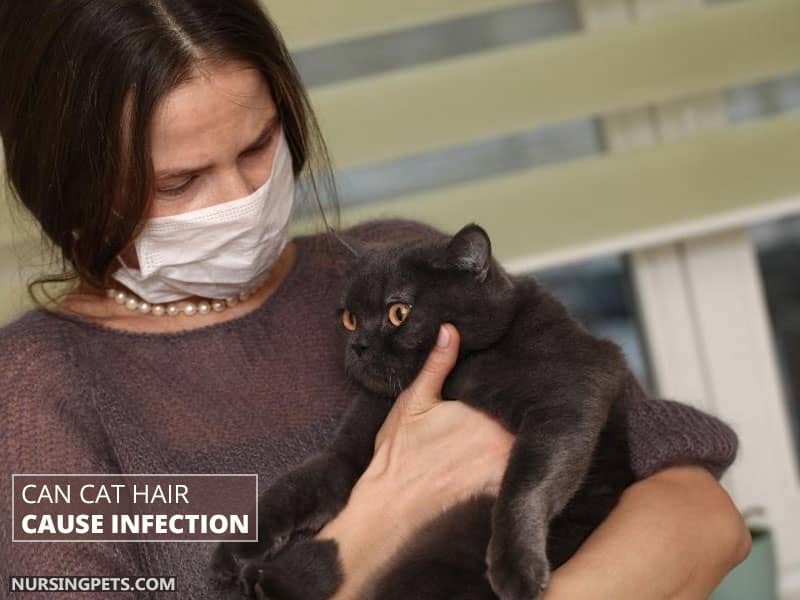
However, it’s important to note that not everyone who comes in contact with cat hair will develop an infection. The risk is greatest for those with weakened immune systems, such as young children or the elderly.
Does Cat Hair Cause Asthma?
A few experts believe that cat hair may contribute to asthma attacks in certain individuals. Cats produce a protein called Fel d 1 in their skin and saliva. And this protein can trigger asthma attacks.
If you have asthma and are allergic to cats but still want to keep a cat. Regularly clean your cat’s litter box and brush them outdoors to keep them clean. And you may also want to consider investing in an air purifier for your home.
Does Cat Hair Make Asthma Worse?
People with asthma may find that their symptoms are worse when around cats or other animals with fur. This is because animal fur can carry dust, pollen, and other irritants that can worsen your aspiratory problems.

A new study published in the journal Thorax found that the person with asthma who were exposed to high levels of cat hair had a higher risk of developing bronchial inflammation.
So, it is generally advised that those with asthma avoid close contact with cats.
Does Cat Hair Cause Diphtheria?
The bacteria that cause diphtheria are not found in cats. And even if a cat was infected with the bacteria, it’s not likely to spread the infection to humans.
Diphtheria is a bacterial infection that primarily affects the nose and throat. It is spread through close contact with someone infected, typically through coughing or sneezing. Therefore, cat hair doesn’t cause Diptheria.
Does Cat Hair Cause Cancers?
There is no clear evidence that cat hair causes cancer. However, some studies have suggested that there may be a link between cat ownership and the development of certain types of cancer, including lymphoma and leukemia.
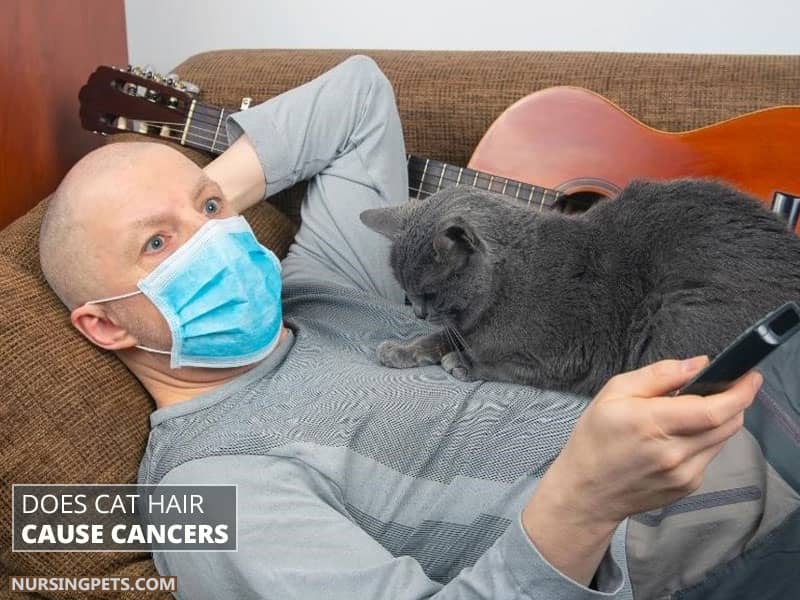
The theory is that cat hair may contain a carcinogenic substance called 3-methylcholanthrene (3-MC). This substance is found in the environment and is also produced by some industrial processes.
The journal Epidemiology found that women who had cats as pets were more likely to develop ovarian cancer than those who didn’t own cats. The link was speculated to be due to 3-MCPD contamination.
Cat Hair Bad for Your Lungs?
If you’re one of those people who are constantly coughing and sneezing around your cat, it might be time to re-think your relationship. It turns out that cat hair could be bad for your lungs.
Researchers believe that cat hair triggers an immune response in the lungs, leading to inflammation. The study’s lead author, Dr. Carl-Fredrik Scheynius, told The Telegraph that the findings suggest that “asthmatics should try to avoid high levels of exposure to cat allergen.“
What Happens If A Cat Hair Goes In Your Nose?
For most people, nothing serious will happen. The hair will eventually work its way out of your nose on its own. In the meantime, you may experience some discomfort, such as an itchiness or tickling sensation.
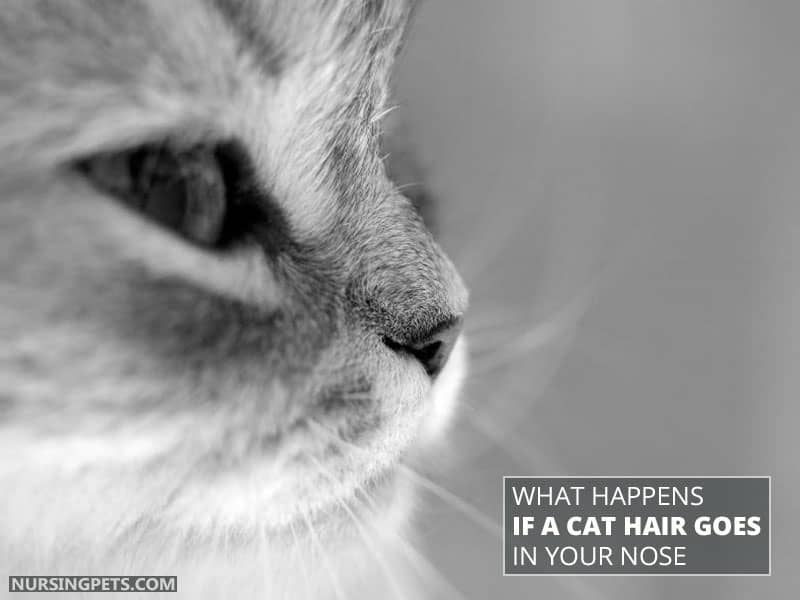
A cat’s hair stuck in your nose could cause an infection in rare cases. This is more likely to happen when you have a weakened immune system, or the hair is dirty.
When you can’t get the hair out on your own, or if you start to experience any pain or swelling, it’s best to see a doctor right away.
Is Cat Hair Dangerous If Swallowed?
There’s no need to worry about your kitty’s hair ending up in your mouth. While it’s not exactly appetizing, swallowing a few strands of cat hair probably won’t hurt you.
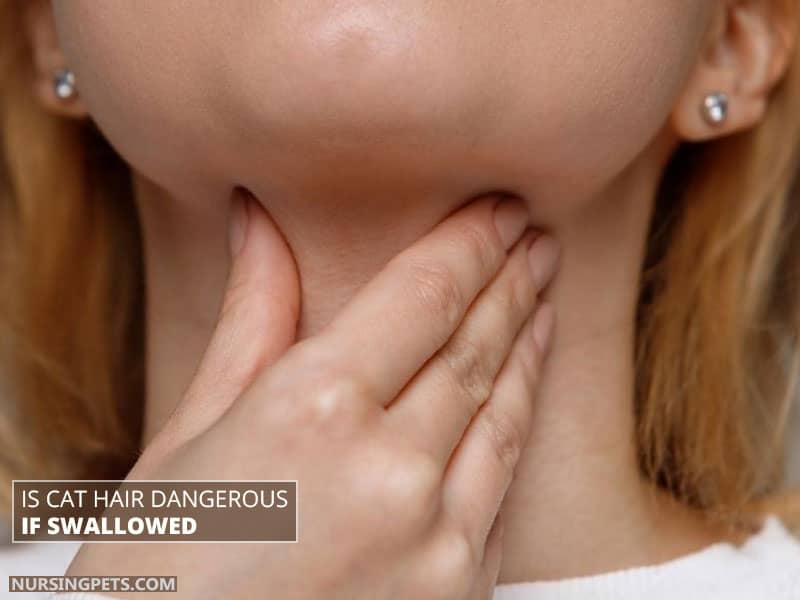
But there is one exception: when your cat is sick or has parasites, her hair could transmit the illness or infestation to you. A weakened immune system is more susceptible to infection.
If your cat is shedding a lot, it’s best to brush them outside or in a well-ventilated area to avoid ingesting too much hair.
How Do I Get Rid Of Cat Hair Stuck In My Throat?
To get rid of cat hair stuck on your throat, you can follow the instructions below:
- Drink a glass of water. The water will help to wet the hair and make it easier to swallow.
- Try coughing. You can also try coughing or using a tissue to remove the hair. This will help to dislodge the hair so you can swallow it.
- Gargle with warm saltwater. It will help to loosen the cat hair from your throat.
When the hair is stuck in your throat, you may need to see a doctor. They can use a small, flexible tube to remove the hair. This is usually a last resort, as it can be uncomfortable and may require sedation.
How Do You Remove Cat Hair From Clothing?
When your cat likes to curl up on your clothes while you’re wearing them, you may end up with a few extra hairs stuck to your clothing.
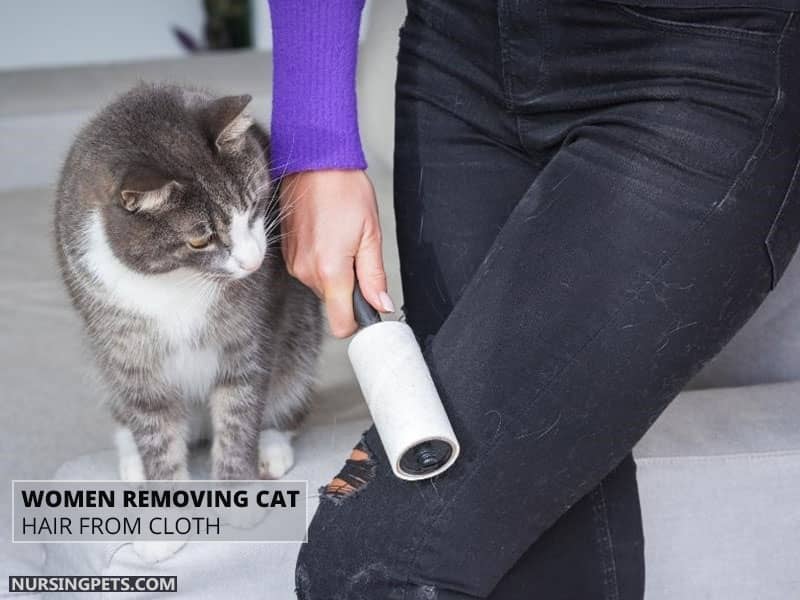
It may seem difficult to remove cat hair from clothing, but there are a few simple tricks you can use to get the job done.
#Lint roller:
Remove cat hair from clothing by using a lint roller. It’s a quick and easy way to pull out any unwanted hair from your cloth. Simply roll the lint roller over the area of your clothing where the hair is, and it will come right off.
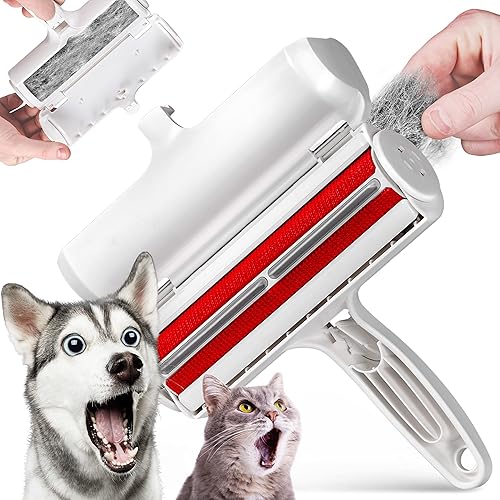
#Damp cloth:
Another way to get rid of cat hair from clothing is to use a damp cloth. Wet a cloth with water and then run it over the area of your clothing where the hair is. The wet cloth will help to loosen the hair and make it easier to remove.
#Vacuum cleaner:
If you have a vacuum cleaner with a hose attachment, you can also use this to remove cat hair from clothing. Run the hose over the area of your clothing where the hair is, and it will be sucked up into the vacuum.

#Piece of tape:
Finally, you can also remove cat hair from clothing by using a piece of tape. Place a piece of tape over the area of your clothing where the hair is, and then peel it off. The hair will stick to the tape and be easily removed.
How Do You Fix Cat Hair Problems?
It’s a common problem for a cat to leave hair everywhere, but there are ways to minimize the shedding and keep the hair under control.
Here are some tips for dealing with cat hair:
1. Brush your cat regularly. This will help remove loose hair and distribute the natural oils from the skin throughout the coat.
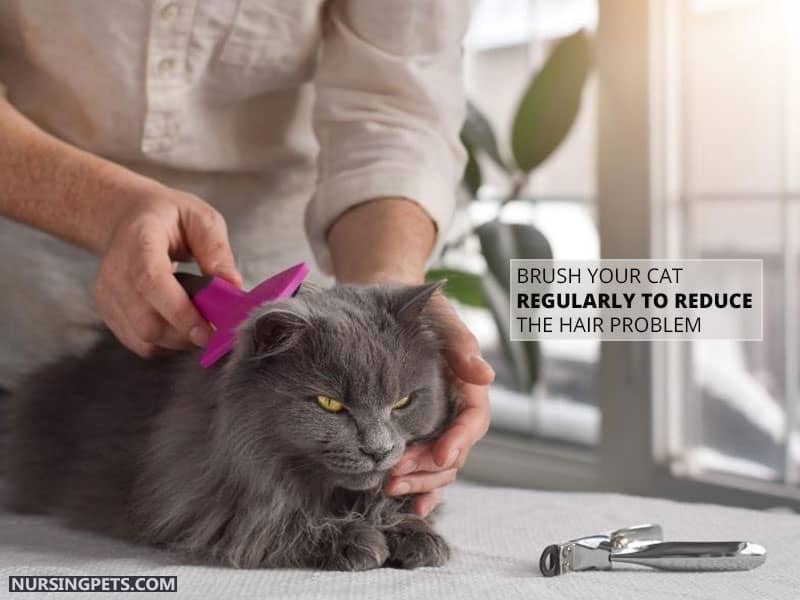
2. Bath your cat. It’ll help remove any dirt and debris that may be trapped in the fur. It will also help to loosen any dead hair that is ready to shed.
3. Use a pet-specific vacuum cleaner. These vacuum cleaners are designed to deal with pet hair and will do better than your regular vacuum.
4. By using a grooming kit, you can keep your cat well-groomed. Regular grooming will help to remove dead hair and prevent matting.
5. Get a short-haired cat. If you’re struggling with hair, you might want to consider getting a short-haired cat. They shed less than long-haired cats and are generally easier to care for.
6. Talk to your vet. After trying all of the above steps, it might be time to talk to your vet if you’re still having problems. There could be an underlying medical condition that is causing the excessive shedding.
By following these simple tips, you can help to reduce the amount of cat hair in your home and keep your furniture and clothing fur-free.
Verdict
Only about 10 percent of the population is allergic to cats, and most of them are not severely affected. People are allergic to cat hair because of the dander that is stuck in it. Cat hair can also be a nuisance, especially with asthma or other respiratory.
But if you don’t have allergies and don’t mind as little hair, then a cat’s shedding shouldn’t be a problem. Be sure to do your research and talk to a doctor to see if it’s a good idea for you before considering getting a cat.


